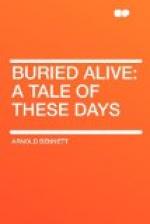And all that was for him! He had brushed pigments on to cloth in a way of his own, nothing more, and the nation to which he had always denied artistic perceptions, the nation which he had always fiercely accused of sentimentality, was thus solemnizing his committal to the earth! Divine mystery of art! The large magnificence of England smote him! He had not suspected his own greatness, nor England’s.
The music ceased. He chanced to look up at the little glooming window, perched out of reach of mankind. And the thought that the window had burned there, patiently and unexpectantly, for hundreds of years, like an anchorite above the river and town, somehow disturbed him so that he could not continue to look at it. Ineffable sadness of a mere window! And his eye fell—fell on the coffin of Henry Leek with its white cross, and the representative of England’s majesty standing beside it. And there was the end of Priam Farll’s self-control. A pang like a pang of parturition itself seized him, and an issuing sob nearly ripped him in two. It was a loud sob, undisguised, unashamed, reverberating. Other sobs succeeded it. Priam Farll was in torture.
A New Hat
The organist vaulted over his seat, shocked by the outrage.
“You really mustn’t make that noise,” whispered the organist.
Priam Farll shook him off.
The organist was apparently at a loss what to do.
“Who is it?” whispered one of the young men.
“Don’t know him from Adam!” said the organist with conviction, and then to Priam Farll: “Who are you? You’ve no right to be here. Who gave you permission to come up here?”
And the rending sobs continued to issue from the full-bodied ridiculous man of fifty, utterly careless of decorum.
“It’s perfectly absurd!” whispered the youngster who had whispered before.
There had been a silence in the choir.




